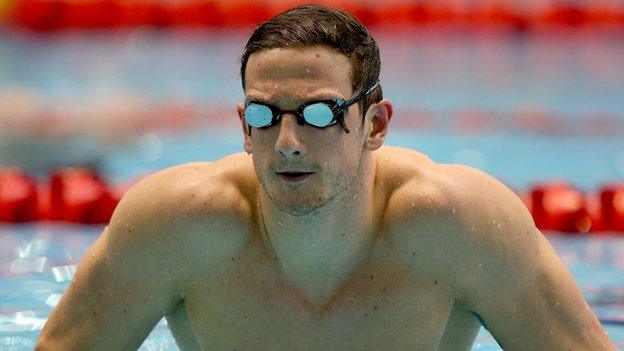Glasgow 2014: Michael Jamieson says silver has been hard to accept
- Published
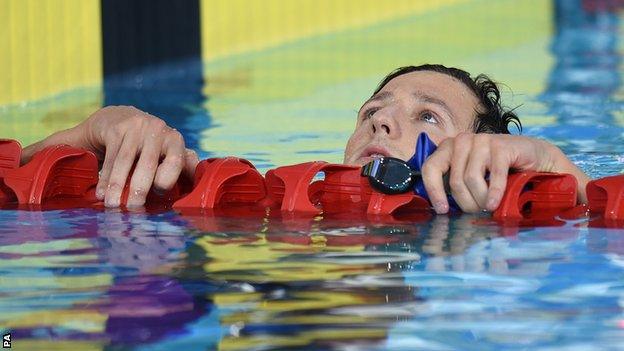
"Time spent with Jamieson on Friday morning told you that he's still hurting, still trying to figure out what happened to him in these Games."
On Thursday night, Michael Jamieson sent Eilidh Child a tweet,, external from the poster boy to the poster girl, with love and congratulations.
"How good was the atmosphere at Hampden tonight?!" he wrote. "So chuffed for @EilidhChild - well done pal!!"
Child had just powered her way up the home straight to take a Commonwealth Games silver in the 400m hurdles, a result that was riotously acclaimed by the Glasgow crowd.
It was delirium on a grand scale. Acclaim tumbled out of the grandstands and didn't let-up. As she made her way around an exultant stadium, stopping every few strides as she picked out family and friends, you got to wondering about the respective fortunes of Scotland's two marquee acts of these Games.
Same colour medal, but very different memories.
Time spent with Jamieson on Friday morning told you that he's still hurting, still trying to figure out what happened to him in these Games. He was 'The Man', the great hope. He was supposed to follow London 2012 silver with Glasgow gold, but didn't. He said he was going to challenge the world record in the 200m breaststroke, but couldn't.
In one of the great 'Wow!' moments of these Games, Ross Murdoch stole his thunder. It was Murdoch's gold and Murdoch's assault on Akihiro Yamaguchi's record time of two minutes 07.01 seconds. It wasn't meant to be this way.
As Jamieson spoke of letting the country down, you felt for him. Spectators move on very quickly from success story to success story, leaving the disappointed in our wake. Heroes are built up and then abandoned when they fail to deliver. It's the nature of the game and it's brutal. The athlete is left to pick up the pieces, alone.
"The few days after my race were quite rough," said Jamieson. "This is a new experience for me being in this position. It's important that I don't make any rash decisions or analyse my performance too much. As an athlete, you always go looking for what went wrong but now is not the time for that."
Jamieson failed to do what we hoped he would do, but the nuance tends to get lost in all of this.
Sure, he swam slower than his best but Murdoch's swim was remarkable. Jamieson wasn't beaten by a plodder. He was beaten by a kid whose time would have been good enough to win Olympic and World Championship silver. This wasn't just Commonwealth Games class, it was class of a much higher order.
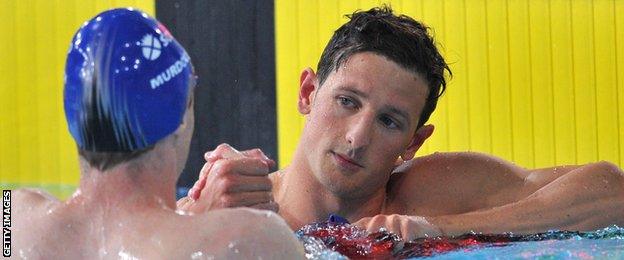
Ross Murdoch's winning time of 2:07.30 would have been enough to beat Michael Jamieson to silver at London 2012 by 0.13 of a second. It was 0.02 off the gold-medal swim.
The trumpet blast of an emerging star.
"Ross has had the week of his life and thoroughly deserved the gold," said Jamieson, who will be 26 on Tuesday, six years older than Murdoch and seven years older than brilliant young Englishman Adam Peaty. He is a veteran in a world of tyros - and he knows it.
Jamieson says it's too early to deconstruct the evening, but it's been hard to get it out of his mind all the same. These past few days, he's taken a few trips to various venues. He's seen some sports and cheered some Scots and has enjoyed himself. People have been generous out there. The kindness of strangers and all that.
You bring him back to the first night of competition at Tollcross.
"Swimming is a sport where you feel a little bit different every time you go in the water," he said.
Ross Murdoch factfile |
|---|
Age: 20 |
Fastest 200m breaststroke time: 2:07.30 (British record) |
Twitter:@RossMurdoch_, external |
Sporting philosophy: "Do or do not, there is no try." |
"Sometimes you can do your work in the warm-up and it feels really easy. Other times you can do it and it feels a little bit laboured. It's not something that necessarily has an effect on your performance, but it's something you immediately start analysing in your head.
"I don't think I was feeling 100% beforehand. I wasn't feeling absolutely brilliant in the water, but that's not something that should be sending alarm bells. I was still confident."
Jamieson said the 200m breaststroke was "arguably the strongest event in the swimming programme", or perhaps "second strongest" behind the 100m breaststroke, the event he failed to reach the final of.
"We knew it was going to take a world-class performance to get on the podium in that 200m," added Jamieson. "I knew that 2:07 was going to be required to win gold, but unfortunately I just didn't have that in my legs on the night."
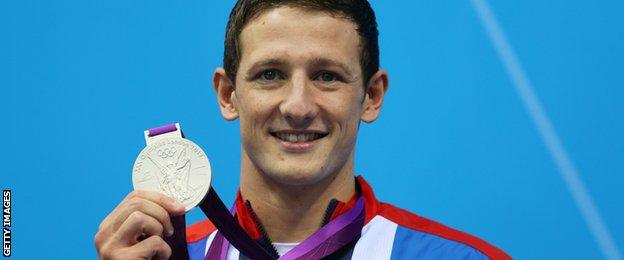
Jamieson broke his own British record to win London 2012 silver, with winner Daniel Gyurta setting a new world record.
Murdoch did - and Jamieson was "a little bit shocked".
He thought he knew how quick Murdoch was. He'd seen his improvement this year. He'd watched him dipping under 60 seconds for the 100m and had seen him go sub-2:10 for the 200m.
"I didn't think he was capable of swimming 2:07," said Jamieson. "He just has this ability to produce another gear in the last 50m. He was able to step up and embrace that environment and use the crowd to his advantage. When you have that ability and the confidence in yourself to produce a performance when it counts, then you've no worries."
In the immediate aftermath of the final, explanations were sought. Murdoch's brilliance should have been reason enough, but a deeper meaning was sought.
Michael Jamieson factfile |
|---|
Age: 25 (will be 26 on Tuesday) |
Fastest 200m breaststroke time: 2:07.43 |
Twitter: @mj88live, external |
Sporting philosophy: "Perseverance and self-belief are the most important things." |
Did the pressure get to Jamieson? Did he take too much on himself? Did his publicly-stated targeting of a new world record only serve to blur his focus on the danger in his midst?
No, no and no again, he said. This is the way he likes it. He wants the burden of expectation. He relishes it. He was honoured to be the frontman for the Scottish team and was energised by the leadership role he assumed.
"In hindsight, I think it probably built up the hype," he said, referring to the story about having the world record time permanently displayed on his bedside clock.
"I've always tried to be fairly honest in my interviews. I was three tenths of a second shy of the world record in London, so it's only natural to want to improve on that. And in doing that, the world record becomes a plausible target. I just wanted to improve on my best time."
Extraordinary though it may seem, Jamieson said he is not a hugely confident athlete or person. "But you have to have a degree of self-belief when you come to these events," he said.
It didn't happen, but that is not to say that it won't happen again. The breaststroke is becoming a fiercely competitive discipline, not just on the home front but internationally. Young guns are lining up in growing numbers and it's this reality that is Jamieson's focus now.
Before last week, he had hardly known failure in the pool, not lately at any rate. He was celebrated in the wake of the London Olympics, feted everywhere he went. His back story was played out over and over again as an example to children everywhere.
He was a role model, an illustration of what passion can bring. In the beginning, he was a reluctant swimmer, refusing to go in the water as a kid for fear of getting cold.
Later, he fell in love with it. He moved to France to better himself. He was coached by the renowned Fred Vergnoux in Paris. Vergnoux didn't think he was good enough. He thought Jamieson was too fragile and too sickly to be a champion.
He'd berate the Scot: "What are you doing here, Michael? What are you doing with us? You'd be better off going home."
And every time he hit Jamieson with a dose of reality, Jamieson hit back by being in the pool at six the next morning. There was no stick big enough to beat the determination out of him. Vergnoux now uses his story as inspiration with his young swimmers. "Learn from Michael Jamieson," he tells them.
Now Jamieson has to do some new learning. "I've experienced everything now," he said. "I'm prepared for anything going into the next couple of years."
He said he will take this dejection and let it fuel the comeback for the World Championships in Russia next year and for the Olympics in Rio the year after. He's down, but he's not out.
- Published1 August 2014
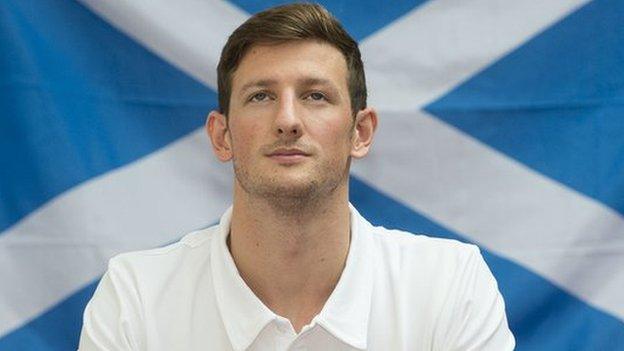
- Published26 July 2014
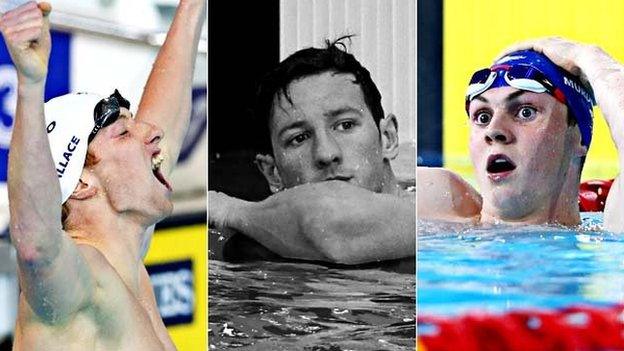
- Published25 July 2014
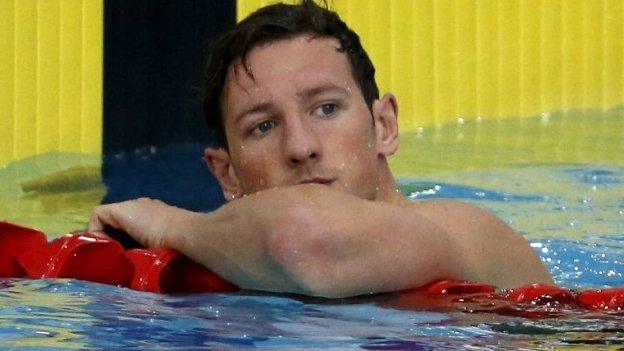
- Published24 July 2014
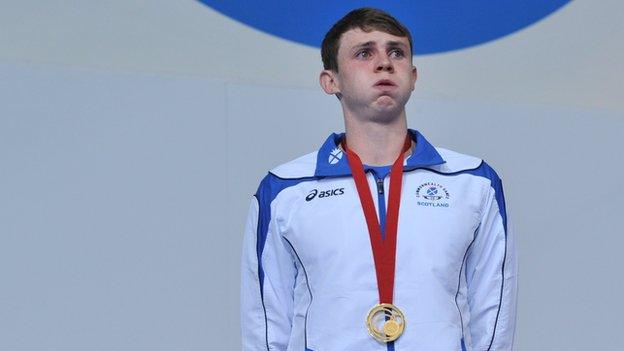
- Published24 July 2014
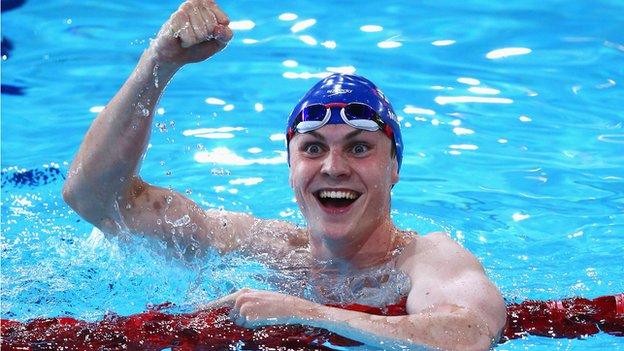
- Published21 July 2014
